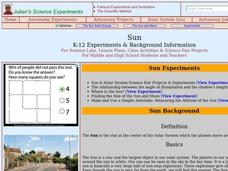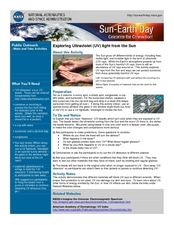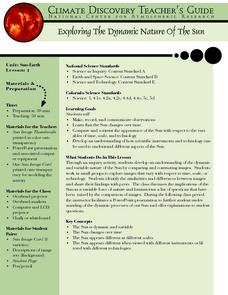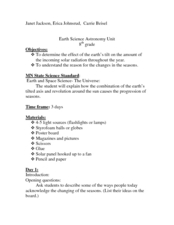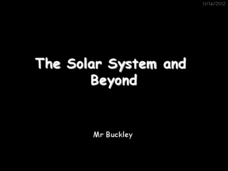Curated OER
Sun Activity
In this space science worksheet, middle schoolers find the answers to the questions concerning the topic of the sun and they label the diagram for the sun.
Curated OER
Earth and Sun's Distance
Students consider the shape of the Earth's orbit around the Sun. They view the first segment of Science Court video and use Timeliner software to construct a scale of the distance between the Earth and the Sun.
Curated OER
Sun
Students study how the sun is at the center of the solar system. For this solar lesson students measure the altitude of the sun and its size.
Curated OER
Rotation Around the Sun
Third graders participate in a hands-on demonstration of the rotation of the earth around the sun. They identify the equator and the North and South Poles on a Styrofoam ball and then spin the ball on a pencil while they also revolve...
Curated OER
Sun-Earth Day Flip Books
Students assemble flip books. In this Earth science lesson, students read about different solar occurrences and create flip books. This teacher resource has links to create six different flip books.
Curated OER
Exploring Ultraviolet (UV) Light From the Sun
Learners identify the different energy given off by the sun. In this earth science lesson plan, students predict where the UV beads will turn the darkest color. They explain the importance of using UV protection.
Curated OER
Exploring the Dynamic Nature of the Sun
Students compare and contrast images of the sun taken at different times and viewed at different scales. They record their observations in a journal and create a graphic organizer to help analyze their observations.
Curated OER
Earth Science Astronomy Unit: Seasons on Earth
Eighth graders describe how the Earth's position causes seasonal changes. In this astronomy lesson, 8th graders explain how solar radiation varies depending on the season. They create a collage or poster on each of the Earth's four seasons.
Curated OER
Science - 'Why does the wind blow?'
In this earth science worksheet, students read a poem about the wind and learn why the wind blows. After reading the poem and informative paragraphs that follow it, kids answer 2 questions regarding the information they read. Finally,...
Curated OER
Day and Night
Inform your elementary scientists why we experience day and night. They are provided with facts and explanation as to why the day and night cycle occur, discuss what they've learned with a partner, and are then given the task of writing...
Curated OER
Unit VIII: Worksheet 3 - Central Force
Beginning physicists imagine being aerospace engineers by solving seven centripetal force problems. They calculate the work, speed, time, and acceleration of objects in orbit: a satellite around Earth, and Earth around the sun. This is a...
Curated OER
The Solar System and Beyond
Survey the solar system by viewing this PowerPoint. Amateur astronomers discover that gravity is responsible for Earth's orbit around the sun and the moon's orbit around Earth. They explore the moon's phases and Earth's seasons. This...
US Environmental Protection Agency
Water Purification by Evaporation and Condensation
This easy-to-perform demonstration shows students how the water cycle, specifically the processes of condensation and evaporation, purifies Earth's water supply. Just mix up some water, dirt, and gravel in a glass bowl, place a cup in...
Curated OER
Water in Earth's Hydrosphere
Environmentalists test stream water for temperature, pH, and turbidity. Each group shares their information and then the class makes an overall evaluation of the water quality. A slide show sets the backdrop for the teaching portion and...
Institute of Electrical and Electronics Engineers
Solar Structures
It's time to soak up the sun! Youngsters read about active and passive solar heating systems, then they collaborate to create a miniature solar-heated building. Provide a variety of materials for them to incorporate and watch their...
101 Questions
Speed of Light
How quickly does light travel long distances? A short video simulates light going from the earth to the moon at two different paces. Scholars relate the distance to the rate to understand which simulation is correct.
Core Knowledge Foundation
Weather or Not, Seasons Change
Embark on a year long investigation of the seasons with this 10-lesson earth science unit. After being introduced to different types of weather and the tools used to measure it, young scientists perform fun hands-on activities that...
Curated OER
El Niño ~ The Return of El Niño
El Niño sure creates a stir when it comes around! Why not stir up your earth science class with this data analysis activity that examines the temperature and precipitation over the 2002-2003 water year. A tracking chart is provided...
Curated OER
The Sun and Moon
Students understand basic concepts about Earth, the Sun and the Moon,
such as relative movement and the phases of the moon. Through discussion, looking at pictures, listening to Native American stories, observing, and building models,...
Curated OER
Sun and Earth
Students explore the sun, its structure, how big it is and how far away it is. In this solar system lesson students complete a lab activity on dew point and weather.
Curated OER
Timekeeping by the Sun
Students measure shadows to learn about the Sun-Earth relationship. In this astronomy lesson plan, students create a shadow stick of a Pokemon character and record measurements of its shadow in a data chart. Follow-up discussions guide...
Curated OER
The Solar System: Go Green with the Sun!
Third graders learn how to use solar power. In this sun, technology and energy lesson, 3rd graders learn how the solar power from the sun can give off energy, learn about solar panels, discuss their uses and benefits, and design a...
Curated OER
The Moon Orbits the Sun?!?!
Students calculate the strength of gravitational force exerted on the moon by the sun and earth. In this orbital activity students view a demonstration to see the gravitational forces between bodies.
Curated OER
Stellar Evolution and the Fate of Earth
Eighth graders identify the different stages in the life cycle of a star. In this astronomy lesson, 8th graders read H-R diagrams and analyze data. The describe how the Sun's evolution will affect Earth in the future.




